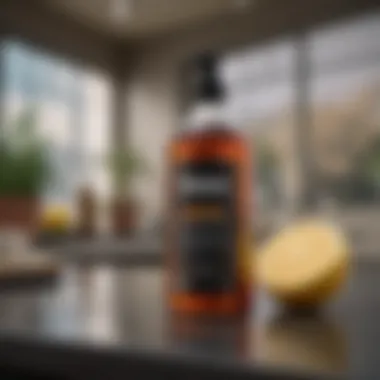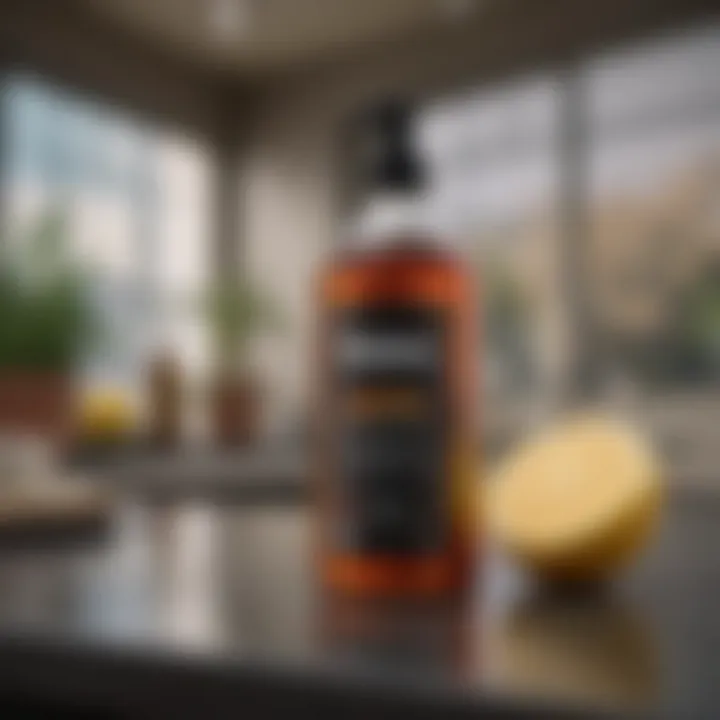Vinegar: A Natural Solution for Odor Elimination


Intro
In the realm of home and personal care, the exploration of natural solutions stands out, particularly one we often overlook: vinegar. Not just a kitchen staple for culinary exploits, vinegar embodies a host of properties that position it as a formidable opponent against unwanted odors. In this piece, we will uncover the scientific explanations behind its efficacy, delve into practical applications across different environments, and highlight some creative DIY methods that harness vinegar's power as an odor eliminator. Aiming at homeowners, interior design enthusiasts, and the occasional party host looking to freshen up their spaces without turning to harsher chemicals, this guide seeks to provide insightful tips and knowledge.
Design Inspiration
When thinking of design—and home aesthetics—having a sense of freshness can truly set the ambiance. Employing vinegar as an odor eliminator within interior designs ties in seamlessly with current trends focused on sustainability and natural living.
Trending Styles
The aesthetic landscape is shifting towards minimalist and eco-conscious designs. Environments characterized by clean lines and neutral color schemes can greatly benefit from a vinegar-infused scent strategy. Consider incorporating:
- Scandinavian minimalism: This design style makes use of simplicity and functionality without compromising on style. A vinegar solution can freshen up spaces while aligning with its uncluttered approach.
- Bohemian chic: Natural materials are paramount here, where the blending of scents through vinegar-based air fresheners can add a layer of authenticity and charm.
Color Palettes
The choice of color within your home can influence not only the aesthetics but also how properly odors can be masked or eliminated. Lighter hues often represent cleanliness; thus, combining your decor choices with vinegar solutions can enhance the perception of serenity.
"A fresh space is like a blank canvas; any unpleasant odors can paint it in shades unsuitable for your style."
Popular palettes to consider include:
- Soft pastels: Create a soothing backdrop that blends seamlessly with the mild aroma of vinegar.
- Earth tones: Rich browns or greens easily allow vinegar's inherent qualities to complement the ambiance without clashing.
Practical Tips
Implementing an odor-eliminating strategy requires more than just mixing vinegar with water; a systematic approach works wonders.
Maintenance & Care
Using vinegar ideally starts with knowing how to maintain the spaces. Regular cleaning cycles should incorporate vinegar not just as an add-on but as a critical ingredient:
- Fridge: A simple bowl of vinegar can absorb musty smells when left inside.
- Carpets and upholstery: Mix vinegar with baking soda for a powerful odor-fighting paste.
Budgeting & Planning
No need to break the bank when you can simply repurpose common household items. Get started by setting aside a small budget for:
- Natural essential oils: Because while vinegar is effective, combining a few drops can enhance the overall olfactory experience.
- Spray bottles and storage: Invest in some quality bottles for creating your DIY mixes that can be handy around the house and can look aesthetically pleasing on your shelves.
In a world striving towards greener lifestyles, this exploration into the science of vinegar underscores its utility not just as a cleaning agent, but as a vital tool in crafting beautifully fresh environments.
Intro to Vinegar as an Odor Eliminator
Vinegar, a common household item, often sits on shelves overlooked, caught between cooking essentials and cleaning supplies. However, its utility goes far beyond salad dressings or spice mixes. It emerges as a powerful, natural odor eliminator that deserves recognition. The significance of this topic cannot be overstated, especially for homeowners, interior design enthusiasts, and anyone seeking to maintain a fresh, pleasant home environment.
Why is vinegar so effective at neutralizing odors? The answer lies in its chemical composition and unique properties that allow it to tackle unwanted smells swiftly. Unlike synthetic air fresheners, which often merely mask odors, vinegar works on a molecular level to eliminate them. Understanding how vinegar accomplishes this task informs users of its versatile applications across various spaces in the home.
The benefits of using vinegar as an odor eliminator are manifold. First and foremost, it poses fewer risks to health and the environment compared to many commercial alternatives. Since it is non-toxic, it fits seamlessly into eco-friendly lifestyles while also being budget-friendly. These considerations align with a growing trend toward sustainable living practices, making vinegar an appealing option.
Additionally, vinegar is remarkably versatile, applicable in kitchens, bathrooms, and living areas alike. With DIY formulations hitting the scene, people can create their own vinegar solutions tailored to specific odor issues. This makes it not only practical but also a fun project for those interested in home care.
However, it’s important to be aware of some considerations. While vinegar is effective against many odors, it may not eliminate every type of smell, particularly those that are deeply embedded in surfaces. Furthermore, its strong, sharp scent might not be pleasant to everyone until it dissipates. So, a balanced understanding of its capabilities is critical for effective application.
The Science Behind Odor Elimination
Understanding the science behind odor elimination is vital for anyone hoping to maintain a fresh and inviting living environment. Vinegar stands out as a natural remedy largely due to its chemical properties that allow it to combat various unwanted smells. The nuances in how odors are perceived, and ultimately neutralized by vinegar, highlight the toolbox nature of this common household item.
Chemical Composition of Vinegar
Vinegar is primarily composed of acetic acid, along with water and trace chemicals depending on the source. The acetic acid content typically ranges from 4% to 8%, offering a distinctive sharpness that many associate with vinegar. This ingredient is not just a culinary staple; it is the powerhouse behind smell elimination. When spills or food particles generate foul odors, chemical components interact with the odors' molecules, breaking them down.
Beyond acetic acid, vinegar may hold other organic compounds that contribute to its odor-neutralizing ability. Options like apple cider vinegar may contain a treasure of beneficial acids such as malic acid, enhancing its effectiveness.
How Vinegar Neutralizes Odors
Vinegar works by a principle that can seem counterintuitive at first. Rather than masking odors with a pleasant scent, vinegar neutralizes them on a molecular level. This action occurs through a process where the acetic acid in vinegar reacts with the molecules that create the unpleasant odor, effectively changing their composition.
Think about how a simple kitchen smell of stale fish can linger. Spraying a solution of vinegar disrupts this equation. The sourness of the vinegar binds with the amines and other odorous compounds, rendering them less volatile. As the vinegar evaporates, the odors tend to fade, leaving freshness in its wake.
"Vinegar shows us that sometimes the simplest solutions are the most elegant – an age-old technique with practical implications for modern living."
There’s also a thermal aspect to consider. The heat that comes from various sources in homes can intensify certain smells. Vinegar tends to evaporate quickly, bringing that sharp clarity back into the air. The end result is not just odor elimination but an environment that feels cleaner and more welcoming.


As you explore various spaces in your home, recognizing the science behind how vinegar performs can help you appreciate its utility far beyond the kitchen. Whether you're combating unwanted pet smells, musty air from the bathroom, or smoke odors lingering in your living room, knowing how vinegar interacts with the air makes it an indispensable ally in your quest for freshness.
Common Odors Targeted by Vinegar
In any home, odors can often be intrusive and unwelcome. While air fresheners mask these scents, vinegar stands out as a natural alternative that not only addresses odors but neutralizes them at the source. Understanding the kinds of odors vinegar can tackle is key for homeowners and design enthusiasts alike. The practicality of vinegar in combating various odors showcases its utility, and enhancing living spaces in an eco-friendly manner is an added benefit.
Kitchen Odors
The kitchen, a hub where delicious aromas mingle and sometimes clash, can be a breeding ground for various odors. From lingering smells of sautéed onions to the pungent scent of burnt toast, these odors not only become embedded but can make the space feel less inviting. Here, vinegar shines remarkably. Its acidity targets the compounds responsible for these smells, effectively neutralizing them.
To combat kitchen odors, creating a spray using vinegar and water can be particularly helpful. Just mix equal parts of vinegar and water in a spray bottle and spritz it around after cooking. Additionally, placing a bowl of vinegar in the kitchen for a few hours can draw in unwanted scents, leaving a fresher atmosphere.
Pet Odors
Household pets bring joy and companionship, yet they can also introduce persistent odors that are less than pleasant. Whether it’s from food, litter boxes, or the pets themselves, odor control becomes essential for maintaining a welcoming environment. Here, vinegar finds its purpose again.
Diluted vinegar can be utilized as a cleaner for pet-related messes. A mixture of vinegar and water does wonders on carpets, upholstery, or pet bedding. It not only removes stains but also kills odor-causing bacteria. For stronger odors, letting a bowl of vinegar sit nearby can create a buffer against any unwelcome scents lingering in the air.
Smoke and Cigarette Odors
Cigarette smoke has an infamous reputation for clinging to environment. The aftermath of smoking, whether indoors or even on clothing, can leave an unpleasant trail that is hard to ignore. Here, vinegar offers a fighting chance to tackle such stubborn smells.
One effective approach is to create a mixture of vinegar with water and use it to wipe down surfaces. Allowing bowls of vinegar to sit in smokers' rooms helps absorb residual smoke odors as well. For those struggling with odor in their clothing or fabric, soaking items in diluted vinegar before washing can often diminish the smell effectively.
Vinegar serves as a versatile tool in mitigating various well-known household odors, giving it a rightful place in any home. It not only enhances the ambiance but does so while embracing a sustainable, chemical-free approach.
DIY Solutions Using Vinegar
When it comes to tackling stubborn odors at home, many homeowners are turning to more natural methods, with vinegar being a front-runner. The importance of DIY solutions using vinegar cannot be underestimated. These methods not only provide an effective way to neutralize unwanted smells but also offer a practical and budget-friendly approach to home maintenance. With a few simple ingredients, you can whip up your own odor eliminators, minimizing reliance on commercial products that may harm both your health and the environment.
Using vinegar in DIY projects promotes creativity and sustainability, allowing individuals to take control over their living spaces. Not only does vinegar cut through stubborn scents, but it also showcases the capability of simple household items to serve multiple purposes. This section provides insights into three popular and effective DIY solutions: creating a basic vinegar odor eliminator spray, exploring the vinegar and baking soda combination, and even blending vinegar with essential oils for an aromatic touch.
Basic Vinegar Odor Eliminator Spray
Creating a basic vinegar odor eliminator spray is straightforward and requires minimal ingredients. You need:
- 1 cup of white vinegar
- 1 cup of water
- A clean spray bottle
Instructions:
- Combine the white vinegar and water in the spray bottle.
- Shake well before using.
- Simply spray the solution in areas where odors linger, such as on carpets, upholstery, or near trash cans. The vinegar will neutralize smells without leaving an unpleasant scent.
This spray is particularly effective against food-related odors, including lingering scents from cooking. With just a spritz, you can refresh your space without resorting to harsh chemical sprays.
Vinegar and Baking Soda Combination
For those tougher smells that cling tighter than a toddler on a sugar rush, the vinegar and baking soda combination proves its worth. The chemical reaction between these two ingredients creates carbon dioxide, which can help dislodge odors from surfaces. Here’s how to create this powerful cleaner:
- 1 cup of vinegar
- 1/2 cup of baking soda
Instructions:
- In a bowl, mix the baking soda with the vinegar. Prepare for fizzing—this is normal.
- Once the fizzing subsides, you can apply the mixture to areas such as drains or carpets that may have pungent odors lingering.
- Let it sit for about 30 minutes before rinsing or vacuuming.
This method is particularly beneficial in kitchens and bathrooms where common smells can become overpowering. Just remember, the magic happens best when you let it fizz a bit.
Vinegar and Essential Oils Blend
If you prefer your space to smell fresh and inviting, consider blending vinegar with essential oils. This option provides the odor-eliminating power of vinegar while masking any pungency with delightful aromas. You’ll need:
- 1 cup of water
- 1/2 cup of vinegar
- 10-15 drops of your favorite essential oil (like lavender or tea tree)
Instructions:
- Combine the water, vinegar, and essential oils in a spray bottle.
- Shake well before each use.
- Spray in areas that need a refresher or mist onto linens for added scent.
This versatile solution not only neutralizes odors but adds a layer of comfort to your environment. It adapts well to different spaces, making it perfect for living rooms and bedrooms.
"Vinegar is one of those unsung heroes in the home ecosystem; it’s regularly overlooked but incredibly versatile."
Overall, DIY solutions using vinegar not only tackle odors but do so sustainably. By using easily accessible ingredients, you can craft your own remedies to keep your home smelling pleasant without resorting to commercial products laden with unidentifiable chemicals.
Using Vinegar in Different Spaces
Understanding how vinegar can be utilized in various spaces of the home is essential for maximizing its odor-eliminating benefits. Each area of the house presents unique challenges with odors, and vinegar’s natural properties provide a versatile solution. Homeowners, interior design enthusiasts, and even those who frequently entertain guests can benefit from knowing how to incorporate vinegar in their cleaning routines. This section outlines key applications of vinegar across different home environments, highlighting the specific elements, benefits, and considerations when using vinegar as a natural odor eliminator.


Kitchen Applications
The kitchen is often the heart of the home, but it can also be a hotspot for unpleasant odors. From cooking smells to spills, vinegar stands out as an effective remedy. Here are a few practical ideas to incorporate vinegar in your kitchen:
- Cleaning Surfaces: Mixing equal parts vinegar and water can create a reliable surface cleaner. This solution not only helps eliminate offensive odors but also sanitizes countertops and cutting boards.
- Deodorizing the Refrigerator: A small open container of vinegar placed inside the fridge can absorb lingering smells from various food items. Alternatively, a cotton ball soaked in vinegar works well; just swap it out every few days for consistent freshness.
- Cooking Odors: After frying or cooking strong-smelling ingredients, simmering vinegar in a pot with water can neutralize stubborn odors, leaving the kitchen smelling fresh.
Incorporating these vinegar applications can transform the kitchen into a pleasant space where cooking doesn't become a battle against residual odors.
Bathroom Solutions
Bathrooms, though necessary, can have their share of lingering smells. Utilizing vinegar in this space addresses both cleanliness and freshness. Here’s how you can effectively use vinegar:
- Deodorizing Toilets: A cup of vinegar poured into the toilet bowl can help eliminate odors and also tackle stains. Let it sit for a while before scrubbing, and the effect will be noticeable.
- Shower Curtain Freshness: Shower curtains can accumulate mildew and odors. Washing them with a solution of vinegar and water can refresh them. Hanging them back up after rinsing them can indeed lift the olfactory ambiance.
- Wastebasket Maintenance: Sprinkling a bit of baking soda at the bottom of the wastebasket followed by a splash of vinegar can help neutralize odors. This combination works wonders in bathrooms where products can inadvertently lead to unpleasant smells.
By applying these methods, homeowners can greatly enhance bathroom freshness and create a more inviting environment.
Living Room and Beyond
The living room is the common gathering spot, and maintaining a pleasant scent is essential for hospitality. Here’s how vinegar can help:
- Air Freshening: A simple bowl of vinegar left on a coffee table can absorb unwanted smells. You might even add a few drops of essential oils to the vinegar for a more pleasant scent.
- Fabric Freshener: If your upholstery or carpets carry a slight mustiness, a mix of vinegar and water in a spray bottle can serve as a light refresher. Test it on a small area first to ensure material compatibility.
- Dusting Solution: Vinegar can also be added to your dusting spray. This not only clears surfaces but also helps remove any stale scents that dust may attract.
Utilizing vinegar in the living room can shift the atmosphere from average to inviting, maintaining a pleasant environment for gatherings and relaxation alike.
"Vinegar tends to be underestimated, but when it comes to odor elimination, its versatility shines in every nook and cranny of the home."
The deployment of vinegar strategies across different spaces guarantees an overall enhancement in the quality of living environments, making it a go-to for anyone looking to keep their home smelling fresh and clean.
Sustainable Practices with Vinegar
Using vinegar as an odor eliminator aligns well with sustainability practices, serving not just to combat unpleasant smells but also promoting a greener way of living. The benefits of utilizing vinegar extend beyond just its effectiveness in odor removal; they encompass a broader environmental consciousness. As many households become more mindful about their environmental footprint, vinegar often emerges as a preferred choice.
Why Sustainable Practices Matter
Practicing sustainability means making choices that do not compromise the ability of future generations to meet their needs. In the context of home maintenance and cleaning, opting for natural solutions like vinegar plays a significant part in reducing reliance on synthetic chemicals. This shift promotes a healthier living environment and encourages responsible consumption.
Reducing Chemical Waste
The production and disposal of synthetic cleaning products contribute substantially to chemical waste. Many commercially available odor eliminators contain a cocktail of harmful chemicals that, when discarded, can seep into the soil and waterways, creating environmental hazards.
By contrast, vinegar serves as a powerful yet simple alternative, being biodegradable and non-toxic. Its application as an odor countermeasure not only helps to eliminate smells but also diminishes the overall chemical load in our homes.
Some key points to consider include:
- Biodegradability: Unlike synthetic cleaners, vinegar breaks down naturally, leaving no harmful residues.
- Concentration: Using vinegar in its concentrated form allows you to control the amount used, thus reducing overall waste.
- Multipurpose Use: Vinegar can tackle numerous household tasks, from cleaning to deodorizing, which minimizes the need for multiple products.
Transitioning to vinegar can have a fighting chance against the buildup of chemical waste that plagues most households today.
Eco-Friendly Home Care
Integrating vinegar into your home care routine is a colossal leap toward eco-friendly living. The versatility of vinegar makes it not only an exceptional odor eliminator but also a remarkable cleaning agent. Examples of everyday applications include:
- Surface Cleaning: Vinegar is safe for most surfaces, including kitchen counters and tables, making it a go-to cleaner without fear of damaging finishes.
- Laundry Freshening: Adding vinegar to your laundry can help neutralize musty odors, acting as a natural fabric softener without synthetic fragrances.
- Dishwashing Aid: A splash of vinegar in your dishwater can help cut through grease and odors, leaving dishes sparkling without chemical residues.
"The beauty of vinegar lies in its multipurpose uses, combining efficiency with environmental stewardship."
Vinegar emerges as a champion sustainer, whose contributions hinder environmental degradation while enhancing the ambiance of our living spaces. As conscientious homeowners look to preserve the Earth, vinegar stands ready with a natural remedy, reshaping the ways we tackle odors and maintain a healthy home.
Comparing Vinegar to Chemical Odor Eliminators
The growing interest in sustainable living and eco-friendly home solutions has put vinegar in the spotlight as a natural alternative to traditional chemical odor eliminators. This section will dive into how vinegar stacks up against these chemical competitors, highlighting both the strengths and weaknesses of each.
Effectiveness in Odor Removal
When it comes to banishing unpleasant smells, vinegar holds its own against many synthetic options. One of the primary reasons for this is its inherent acidity, which enables it to neutralize odors rather than simply mask them. For instance, when faced with the stale scent of leftover takeout, a quick spritz of a vinegar solution can cut through the grease and lingering aromas effectively.
A number of people might wonder, though, just how well vinegar does compared to powerful chemical sprays designed specifically for odor removal. While some may argue that commercial products ensure quicker results, studies show that vinegar can disrupt odor-causing compounds just as well, given the right application. Here’s a closer look at the practical scenario:
- Vinegar: It may take a bit of time; the odor dissolves gradually, eliminating the source effectively without any residue.
- Chemical Sprays: Matted down strong odors faster but can leave behind a fragrance that isn’t always pleasant or natural.
A more natural approach aligns well with modern considerations towards health and environment, making vinegar a choice many are leaning toward. Yet, fragrance preferences vary widely among individuals, which could sway opinions depending on personal needs.
Health and Safety Considerations
The health implications tied to everyday cleaning products are hard to ignore. Many chemical odor eliminators contain harsh substances that may contribute to respiratory issues or skin irritations. For families with young children or pets, this can pose a significant concern. In fact, the American Lung Association has reported that some indoor air quality problems stem from such products, raising red flags for conscientious homeowners.
On the other hand, vinegar is generally regarded as safe. It does not contain harmful fumes or synthetic dyes. In certain situations, such as the kitchen and kids' play areas, using vinegar-based solutions can take the burden off worrying about toxic exposure — and that’s a comfort many look for.


No solution, however, is without its complexities. For those with very sensitive noses, the sharp smell of vinegar might not be ideal, even if it fades quickly. Balancing the concerns of health and personal comfort is vital when choosing how to combat odors in the home.
"In the end, opting for vinegar not only supports a cleaner home but also favors a healthier living environment."
Practical Tips for Effective Use
When it comes to utilizing vinegar as an odor eliminator, proper application can make all the difference. This section provides valuable insights into the best practices for applying vinegar solutions in your home and how to store these solutions effectively. Understanding these elements ensures that you maximize the benefits of vinegar while minimizing any potential downsides.
Best Practices for Application
To get the most outta your vinegar solutions, there are a few best practices you might want to consider:
- Dilution Matters: Vinegar is powerful, but using it in its concentrated form can be a bit too much for certain tasks. Mixing one part vinegar with three parts water creates a balanced solution that's effective for most odor removal.
- Spray Away: Use a spray bottle to apply vinegar solutions. This helps to evenly distribute the mixture over surfaces. Aim for an even coat without soaking the area.
- Target Problem Areas: Don’t just spray everywhere. Focus on specific spots where odors tend to linger, like in the kitchen around trash cans or in fabrics that absorbed strong smells.
- Timing is Key: Allow the vinegar to sit on the surface for a while. Giving it at least 15-30 minutes before wiping it off makes the solution more effective for breaking down odors.
- Ventilate: Ensure good airflow in the area where you’re applying vinegar. Open windows or turn on fans to help dissipate the smell, allowing fresher air to move in.
By keeping these tips in mind, you can effectively use vinegar to combat various odors in your home.
Storage and Handling of Vinegar Solutions
Storing vinegar solutions properly is just as crucial as using them effectively. Here’s how you can ensure longevity and effectiveness:
- Choose the Right Containers: Opt for dark-colored or opaque spray bottles. This helps to protect the solution from light, which can degrade its efficacy over time.
- Label Your Solutions: Make sure to label containers with the contents and date of preparation. This will help you keep track of freshness and ensure you don't mix up solutions.
- Cool & Dry: Store your vinegar solutions in a cool and dry place, away from direct sunlight. High temperatures can alter its properties, making it less effective.
- Check Regularly: Periodically inspect your solutions. If they start to develop a strange odor or appearance, it's best to get rid of them and whip up a fresh batch.
- Avoid Mixing: Don't combine vinegar with bleach or other chemical cleaners in storage. This can create toxic fumes that are harmful to breathe.
By adhering to these storage and handling tips, you can make sure that your vinegar solutions remain potent and ready to tackle odors whenever needed.
"Vinegar is not just a kitchen staple; it’s a versatile tool for maintaining a fresh home environment."
Challenges and Limitations of Using Vinegar
When discussing vinegar as an effective odor eliminator, it’s crucial to consider the challenges and limitations that accompany its use. While vinegar holds many advantages, understanding its constraints can help homeowners and design enthusiasts make informed choices. After all, nothing is perfect, and vinegar is no exception.
Effectiveness on Strong Odors
When it comes to combating strong odors, vinegar can sometimes meet its match. Vinegar works by neutralizing odors instead of masking them, which means it can take a little longer for its effects to be noticed. For particularly pungent smells—like those from skunks or rotten food—it may not completely do the trick. It can diminish odors, sure, but in some cases, homeowners might find the combination of the vinegar smell and the original odor a tad overwhelming.
In certain environments, relying only on vinegar might not yield the desired results. For instance, in an area with prevalent mildew or heavy cigarette smoke, it might require multiple applications or different methods to fully rid the space of these stubborn scents. This brings to light an imperative point—while vinegar is a fantastic tool in the odor-fighting arsenal, it shouldn’t be the sole approach when dealing with intensely troublesome smells.
Potential Damage to Surfaces
Another pivotal factor to consider involves the potential impact of vinegar on various surfaces. Although vinegar is a celebrated cleaner, it can also be a bit like a double-edged sword if misused. The acidic nature of vinegar can be harsh on certain materials, particularly natural stone like granite or marble. Using vinegar on these surfaces can lead to dulling or etching, leaving a less-than-stellar finish.
Moreover, when applied to wood finishes, straight vinegar can damage the protective coatings or the wood itself. Homeowners would do well to test vinegar solutions on a small, inconspicuous area before going all in. It’s often wise to dilute vinegar with water when applying it to sensitive materials, enhancing safety while still benefiting from its odor-eliminating properties.
In summary, while vinegar serves as a budget-friendly, eco-conscious solution against odors, those using it must be aware of its limitations. By understanding both the situations where vinegar shines and those where it struggles, homeowners can navigate their odor removal strategies with improved effectiveness and confidence.
"A little knowledge can take you a long way. In the case of vinegar, learning its strengths and weaknesses will help safeguard your surfaces and improve your odor-fighting game."
Ultimately, balancing vinegar's strengths and limitations can enable effective cleaning while preserving the integrity of one's living spaces.
Success Stories: Real-Life Applications of Vinegar
Vinegar, a common household item, has made waves in the world of odor elimination; its versatility and effectiveness are often highlighted through various real-life experiences. As a deeply ingrained part of many households, stories of successful vinegar applications can shed light on its genuine utility, illustrating that its potential reaches beyond mere salad dressing. Through these narratives, homeowners, party hosts, and gardening aficionados can better grasp its benefits, techniques, and considerations.
Case Studies and Examples
- Eliminating Cooking Odors in the Kitchen
One homeowner shared an experience of battling persistent fish and garlic smells after dinner parties. The issue wasn’t new to her; guests would frequently remark on the lingering scents. Instead of resorting to expensive commercial products, she turned to a simple solution: boiling a pot of water mixed with a cup of vinegar on the stove. After about twenty minutes, she noticed a remarkable difference. Not only were the odors neutralized, but the air also felt fresher, showcasing the power of vinegar in an everyday scenario. - Dealing with Pet Odors
Another case involved a dog owner with a beloved but odoriferous pet. The trouble was the persistent smell from the dog bed and areas around the house. Determined to use a more natural approach, the owner created a vinegar-based spray by mixing equal parts of vinegar and water. Spraying the affected areas daily helped reduce odors significantly. Over time, he found that this solution was not only effective, but also cost-efficient and safe for his pets, a crucial consideration for any pet owner. - Smoke from Fireplace
One family, called upon by their friends for a winter gathering, faced an embarrassing dilemma after a night of using their fireplace. The smoky scent clung to every fabric. Instead of panicking, they opted for vinegar-infused solutions. After soaking a few cotton balls in vinegar and placing them strategically around the living room, they found that the odor faded rapidly. Their ingenious use of vinegar not only saved them from potential embarrassment but also highlighted the importance of quick and easy solutions when hosting gatherings. - Garden Freshness
In the gardening community, vinegar shows up again with stories of revitalized potpourri and floral arrangements. A flower enthusiast discovered an old vase with a musty odor where cut roses had long since wilted. After a swift clean with a solution of vinegar and water, the vase not only returned to being visually appealing, but it also regained its pleasant scent. This application emphasizes vinegar’s delicate balance of cleanliness and floral freshness.
These examples of vinegar at work underscore not just its power as an odor eliminator but embrace a broader awareness regarding home care. With simple adjustments and creative thinking, vinegar can aid in overcoming some of life’s more frustrating challenges, making it a valuable asset in the modern home.
"Each success story brings new insight into how vinegar can be more than just a kitchen ingredient; it's a resource for cleanliness and comfort in our daily lives."
By sharing these practical experiences, it becomes clear that vinegar is not relegated to the back of the cupboard; it’s a functional companion in both the everyday routines and festive gatherings of life.
End: The Role of Vinegar in Modern Homes
In an age where sustainability and health consciousness are gaining traction, vinegar emerges as a particularly valuable tool for households. Its multifaceted properties not only help in eliminating unwanted odors but also showcase its adaptability across various living spaces. By engaging with vinegars natural solutions, homeowners can effectively tackle everyday challenges, from kitchen spills to pet-related scents, without resorting to chemical-laden products.
Vinegar’s presence in modern homes symbolizes a shift towards environmentally friendly practices. Those looking to enhance their living conditions while being mindful of their ecological footprint will find that vinegar is more than just a condiment; it is an agent of change. Its affordability and multipurpose functionality make it an easy choice for anyone aiming to keep their home clean and fresh.
Final Thoughts on Vinegar as an Odor Eliminator
While many odors can be stubborn, vinegar has a knack for neutralizing them efficiently. It operates on a basic yet effective principle: its acidic nature interacts with alkaline odor molecules, rendering them neutral and less offensive. This simple yet scientifically sound approach demonstrates the effectiveness of vinegar over time.
Engaging with vinegar solutions in your home allows for a practical approach to odor management:
- Flexibility: You can customize mixes to cater to specific odors.
- Cost-Effectiveness: Using vinegar is often cheaper than store-bought sprays, which can become expensive, particularly for those who are diligent about maintaining a fresh-smelling home.
- Health Benefits: Many commercial products contain harsh chemicals, while vinegar stands as a safe alternative for both people and pets.
Ultimately, the integration of vinegar as a staple in modern domestic routines champions the idea that cleanliness doesn’t have to come with a hefty environmental price tag. With the right knowledge in hand, anyone can not just clear the air but create a healthier living environment, allowing for not just a fresher home but a fresher outlook on sustainable living.
"Vinegar represents a cornerstone in eco-friendly home care, providing practical solutions rooted in nature's own provisions."
In summary, vinegar transcends its basic culinary role it stands as a valuable ally in modern home management, one that every conscious homeowner and design enthusiast should embrace.















